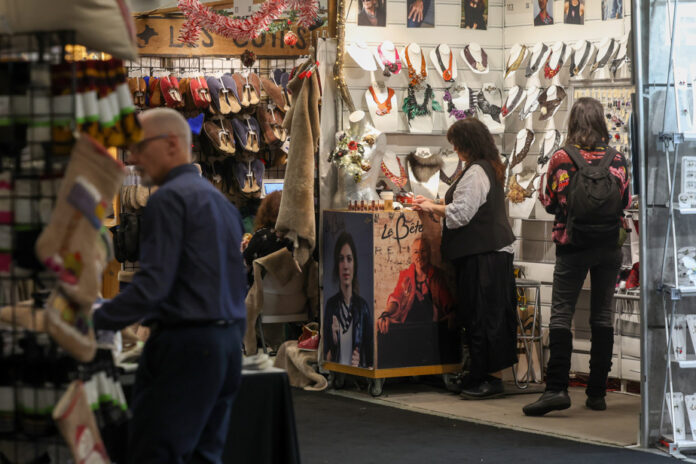“You have to work three times as hard to make the same money,” says Nathalie Joannette, co-founder of Fou du porc. Its charcuterie products, produced in Kamouraska, are sold in 450 points of sale in Quebec. The entrepreneur has privileged contact with her retailers. And she is very concerned. “I sell directly to my customers,” she says. I know them and what I observe is great nervousness among small business owners. »
Nervousness leads to caution which translates concretely into a decline in orders. “Inflation does not subside, it persists over time,” says the butcher, who maintains that this ambient concern hurts local purchasing. “People are worried financially. The more worried we are, the more we look at the price, the more we go to Costco and less to the small local grocery store. »
Fou du porc was present at the Arts and Crafts Fair and at the Souk, holiday markets. Which allowed its owner to chat with her Montreal customers. Several customers have admitted to him that they believe they do not have the means to favor local products all year round.
“I suggest they try putting $25 out of their grocery basket for Quebec products,” confides Nathalie Joannette. Or $10: just a portion to have the rigor and consistency to buy Quebecois and to be aware of it. » This would make a huge difference to the local economy, says the entrepreneur. And for the family: “It’s a great exercise to do with the children. What do we want to do with our money? Is it at the grocery store that we buy Quebecois? Do you buy a gift made by an artisan once a year? »
Julien Sylvestre does not hide it, even at the famous Montreal Art Fair, inflation is felt. “The show is going well,” said the general director of the Quebec Crafts Council. That said, yes, we are seeing a slowdown in local purchasing. »
Which surprises neither the director nor the exhibitors. The Salon des crafts d’art is also a fair for entrepreneurs, recalls Julien Sylvestre. According to him, artisans have held other shows this year and are seeing declines everywhere. “People are more attentive to their needs and let themselves be carried less by the wave,” he says, even in the bubble of a Christmas market.
Bad news for local retailers and manufacturers of local products, the consumers most inclined to favor local purchasing are those who have reduced their consumption the most over the last year, we learned from the Responsible Consumption Barometer. ESG UQAM last month.
“That is to say, those who are the most responsible are those who have reduced their consumption, but they favor the local economy,” explains Fabien Durif, professor in the marketing department and director of the Consumption Observatory responsible for UQAM.
“The fall was tough for everyone. People are buying less and we feel that [local purchasing] is less at the heart of their priorities, for many reasons. Everyone felt this shortness of breath. »
Local businesses must work harder, admits Pascale Rémond, co-owner of Minettes in Vieux-Sainte-Rose, in Laval, who has made Quebec products her specialty.
“During the holiday season, despite inflation, despite the economic situation which is not easy, we see that people want to treat themselves,” she says. Christmas, and particularly this year, is a crucial period for these destination businesses where we enter with the idea of spoiling our loved ones and ourselves. In January, work to raise awareness of the importance of local purchasing will resume with a vengeance.
“We want to re-sensitize people to perhaps consume less, but consume better,” says Pascale Rémond. To make choices towards quality rather than quantity. »
Cheesemaker Yannick Achim confirms this: traders are working harder to stay the course. The employees of its six cheese factories, who talk a lot with customers, noted that it relies on safe values.
“For a customer, currently, it will be a greater challenge to go for a product that he does not know,” relates Yannick Achim, “since he does not know if he will like it, even if he is cheaper. Some will opt for products they know. »
And businesses they know. Hence the importance of keeping your customers, because a consumer who changes niche, who moves to a large store, risks changing his habits for good.
“It’s always more difficult to seek out a client or even to seek out a new client than to keep the clients you already have,” estimates the entrepreneur, who expects to have a good holiday season , but who fears that the start of the year will be slower than usual.
According to the director of the Responsible Consumption Observatory, the arrival of well-identified Quebec products at Walmart is excellent news. “This democratization and easier accessibility could maintain local purchasing or prevent it from crumbling,” explains Fabien Durif, who believes that it is necessary to maintain promotions and visibility campaigns to promote products made in all or part here. “Even the most affluent citizens are now going to lower-cost grocery stores and retailers,” he says. So being at Walmart is very good. »
Fabien Durif maintains that consumers still have this desire to support the local economy. “Since the pandemic, it’s really a new motivation,” he says. It existed before, but it wasn’t as strong. » According to the professor in the marketing department at UQAM, political discourse brought economic nationalism, which remained strong despite inflation. On the other hand, the most recent Responsible Consumption Barometer tells us that for 66% of Quebecers, “buying local products is too expensive for their budget”.
Have local products been classified as luxury? “We have this perception that when it comes to local purchasing, it’s more expensive. And it’s sometimes a false perception,” says Fabien Durif, who recalls that, in certain categories, studies have proven that buying local is equivalent, in terms of price.















